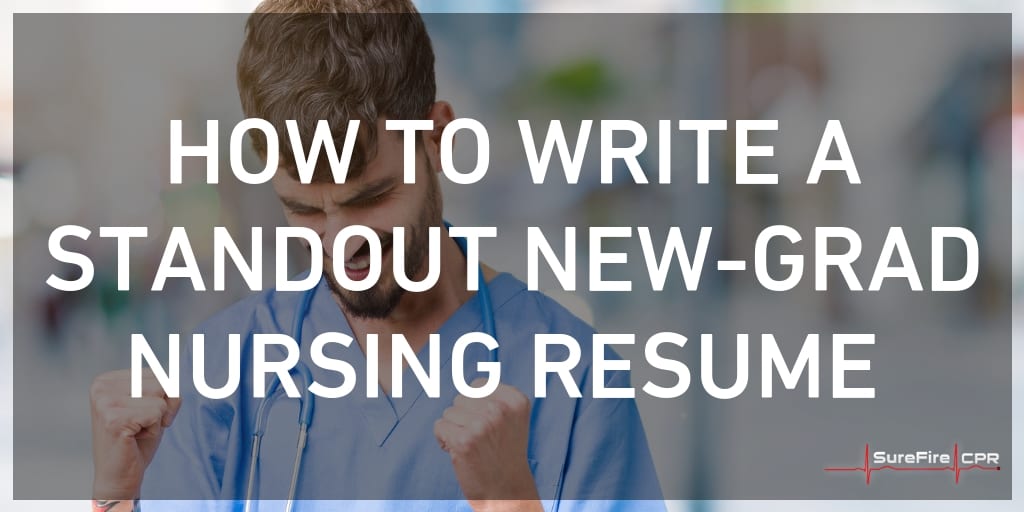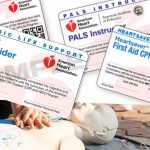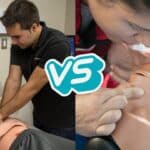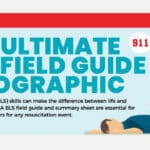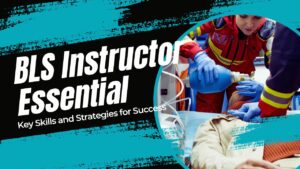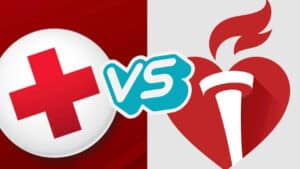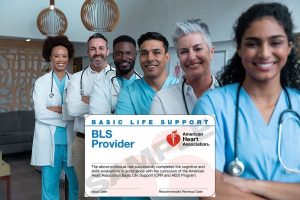With so many new graduates coming out of nursing school looking for employment, it can be difficult to stand out amidst a sea of other eager job-seekers. One indispensable tool for standing out is your resume. During the nursing-job selection process, a well-formatted, detailed, and eye-catching resume can skyrocket you past stacks of other candidates. You know that you will make an excellent nurse; now it’s time for the recruiters to know just how great you are by giving them the best possible nursing resume you can put forward. In this guide, our experts here at SureFire CPR cover eight essential tips for how to write a new-grad nursing resume or even upgrading any nursing resume. Read on to transform your resume from same-old to standout in minutes, and check out our award-winning certification courses — great resume boosters for nurses, assistants, and other care professionals.
Don’t Go Over-the-Top (or Over-the-Limit) With Your Formatting Choices
Every new-grad nursing resume should be one page in length. Period. End of Sentence. Adding a few extra lines onto the second page in order to get everything that you need is a no-go. Explore different ways to format your resume to fit in everything you need. (Don’t mess around too much with margins or font size though. There’s nothing worse than a resume that looks like a college student’s test cheat-sheet.) Most importantly, don’t be afraid to edit. Cut and consolidate items in order to get them all onto one page.
Most of the best-formatted resumes utilize the bullet point method of describing various skills, job experience, and other relevant information. Don’t fall into the trap of writing out lengthy descriptive paragraphs that hit on every single point under the sun. Be choosy with how you summarize and elaborate. Use one to two bullet points underneath your primary headers and make sure that each bullet point doesn’t stretch on any longer than two lines.
Don’t Color Outside the (Guide)Lines
When it comes to resume design, it’s easy (and tempting) to do too much. You might think that you’re giving yourself a leg up with colorful paper choices and/or using an ink tone that is anything but black, but you’re not. Sure, it’s making you stand out among the sea of black and white resumes, but it’s making you stand out in a bad way. There are common practices in resume writing that are there for a reason. Resume readers want to be wowed by the content of your resume, not surprised by the creative liberties you took with your delivery method. Impress readers with the content of your resume; don’t drive them away with the color and layout.
Write for a Reader That Knows the Nursing Field
You’re writing to professionals who know a lot about your field (it’s also their field), so don’t waste a portion of your precious one-page-long real estate explaining what a Clinical Rotation is or being overly descriptive of the basic nursing school curriculum that you completed. Nursing recruiters already know all that stuff inside and out. What they don’t know is what sets you apart from all of the other applicants in the stack of resumes. Provide them with pertinent information in short, to-the-point explanations that get across what you did, what you specialized in, and other important details pertaining to the specific rotations you did in nursing school.
Highlight What Sets You Apart
Did you graduate in the top five of your nursing school class? Did you receive any specific awards throughout your time there? Any honors from high school or in your Associates’ program? Be sure to not only list these out, but also expand on why exactly your awards should be recognized as big deals. Provide the full name of the award (the longer the name, the more legitimate it seems) and the date you received it. Resumes are meant to be braggadocios, so don’t hold back from mentioning how you beat out 40, 50, 60 of your other classmates to earn this award.
Don’t Turn in Resume That’s Heavy on Fluff, Light on Relevant Credentials
It’s an unfortunate fact that many nursing school graduates probably have zero real work experience outside of school. That’s okay. Everybody’s got to start somewhere. If your new-grad nursing resume feels insufficient, don’t fall into the trap of including extraneous qualifications and background information (AKA fluff). Certain elements that seem like they’re good things to mention on your first-ever nursing resume might not be all that important after all. These are things that every single graduate of a nursing program should have, such as a BLS Certification and ability to properly place an IV. While you should mention them, don’t spend a third of your resume delving into these basic elements in depth. Mention them quickly so that recruiters know you have them, and then move on. Recruiters are looking for the necessities, but they want to read and focus on the stuff that sets you apart. Mention your CPR certification, but don’t give it bullet points. Save those for your clinical rotations, volunteer work, and other unique experience.
Do Put in Extracurriculars (When They’re Relevant)
You’re fairly green to the nursing field and the workforce at this point, so odds are you’re going to have some space to add some extra stuff to your resume. Fill in those blank spaces with pertinent, character-illuminating extracurriculars that you’ve engaged in. A line or two about how you’ve volunteered at nursing homes or organized a study group can speak to aspects of your character and your future nursing abilities better than many aspects of your education, certificates, and test scores can do on their own. Don’t be afraid to narrate with your bullet points and highlight your strengths through your experiences. But, as always, be mindful of length. When it comes to your descriptions, think tweets and not treatises.
How to Format Your Licenses and Certifications
Hopefully at this juncture, you have certifications and accredited licenses to stick on your resume. Choose a set formatting style for all of your licenses and certifications and stick to it for the whole resume. We recommend writing out the full name of the certificate or license followed by the full name of the licensing body on a single header line. Down in your bullet points is where you can talk dates of your certification and when it expires. Be sure to note if the license in question is a part of the Nursing Licensure Compact down in the bullet points as well.
Fill in the Holes in Your Certifications
If you’ve completed nursing school, congratulations. You have a wide range of credentials under your belt. Here’s the rub: so does everybody else. For example, having BLS training is a baseline and if you want to have an exemplary resume, you’ve got to go above and beyond the basics. Get your Advanced Cardiac Life Support (ACLS) certification. Considering working with kids? Obtain your Pediatric Advanced Life Support (PALS) certification. Want to work in a NICU? Take Neonatal Resuscitation (NRP) classes and get certified. Take a Hospital Fire Safety Class to learn emergency patient carries, drags, and fire extinguisher techniques. Not only can these certifications give you experience in more specialized areas of nursing, but they also show potential employers that you are willing to go the “extra mile.” Perseverance and determination are two qualities that employers are usually looking for in new hires. Best of all, these great resume building classes can all be completed in relatively short stretches of time — in many cases, quick enough to make the application deadlines for your top nursing choices.
Get Certified and Boost Your Nursing Resume With SureFire CPR
By now you’ve learned how to write a new-grad nursing resume, but before submitting one you can complete some advanced certifications for that extra boost. Advanced certifications can add legitimacy to any nursing resume. Here at SureFire CPR, we are proud to provide the above certifications and more to individuals and groups in Southern California. We offer regularly scheduled classes 7 days a week morning, day, and night. If you can squeeze out a couple of hours somewhere, you’ll be able to get that certification to boost your resume. Explore our website and contact us to see how affordable and straightforward getting these resume-polishing certifications really is with our award-winning team here at SureFire CPR.

